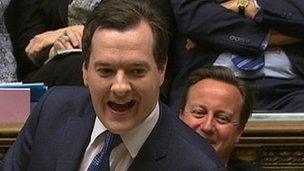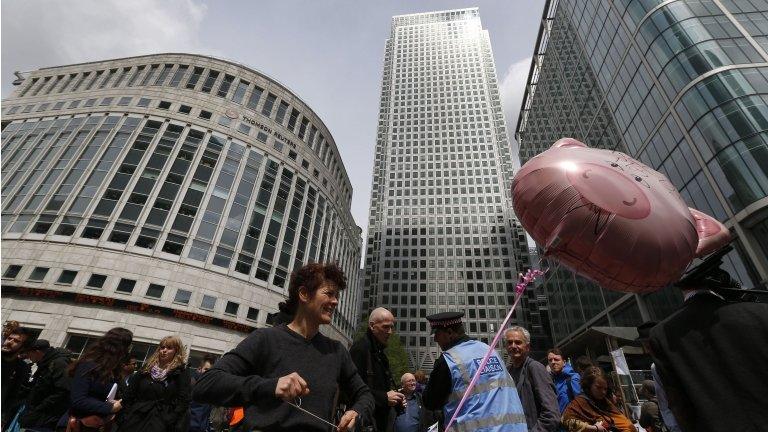The politics of squeezed spending
- Published

Mr Osborne said the cuts will ensure Britain "lives within its means"
It's not obvious what Wednesday's single-year spending review was for. It didn't change the spending envelope by much.
And for all the talk of big capital spending, the total public sector gross investment figure is actually down by 1.7%.
So, in the absence of having much to say about spending, why not deploy the statement for political ends?
The 2015-16 financial year, on which George Osborne's statement focussed, starts with the next Westminster election, and it comes seven months after the independence referendum.
If the SNP administration gets its way, the year will be dominated by negotiations on EU membership, share-out of the Bank of England, national debt and embassies, among other institutions and UK assets.
But the Treasury is taking a 10% hit to its budget, on top of some sharp administrative cuts already. So while officials and post-election ministers are busy on the much more challenging spending review from 2016 onwards, you can't be sure there will be the Treasury staff available to do all the talking with St Andrew's House. (This is a serious point, and all the moreso for the capacity constraints as the administrative budget is slashed in Edinburgh too.)
However, next September's draft budget will have to assume block grant spending continues more or less as usual. Actually, it's less, in that current spending's down, and an element is being withdrawn in lieu of stamp duty and landfill tax revenue which Holyrood will be raising that year.
Big tent
As Brian Taylor explains, the spending review will force Finance Secretary John Swinney to decide if he's going to follow Mr Osborne by taking the axe to automatic progression pay for much of the public sector.
It's worth noting how little Mr Osborne seemed concerned at the impact of that on the people who work for him, or that austerity is due to strip out another 144,000 jobs under his current plans. To put it gently, he's not trying to appeal to public sector unions. He had a good story to tell, instead, about the economy's ability to create private sector jobs, without too much attention to detail about what kind of jobs they are.
Nor did he express much concern at the potential implications of the cap he's planning to put on the welfare budget, having made clear it didn't affect the state pension or those pensioners who rather like things the way they are.
The only impact on them will be a cut to winter fuel allowance for those drawing their pensions while living in foreign countries with higher average temperatures than Britain's. You'll note that the logic doesn't extend to those within Britain who face lower average temperatures.
John Swinney wants to be a bit more canny. He's not about wedge issues with which to trip up his opponents, but about securing the big tent support the SNP gathered in 2011. The finance secretary has to appeal to those public sector workers, as there are quite a lot of them in Scotland. He's got to talk up employment. And it's not part of SNP tactics to make life more difficult for benefit claimants.
Amid the political game being played by George Osborne and his Labour foe, Ed Balls, it's striking that Labour's recent shift in post-election spending commitments leaves the SNP as a lone Scottish voice arguing for more borrowing to stimulate growth.
That's odd, when you consider it's a point of view supported by a significant body of mainstream economist opinion. But the consensus between the big three at Westminster probably reflects polling figures that put the public on the side of George Osborne, when asked if there's a need to cut the deficit. Labour's calculation is that it needs to do whatever it takes to win back a reputation for credibility in handling the public finances and the economy.
Breaching the ring-fence
Apart from the politics, I offer two observations. First, the ring-fence around the NHS and schools is under threat.
For a start, £3bn of English NHS budgets are to be shared with councils to improve joined-up social care provision. That makes a lot of sense for the way the public encounter services, but it also undermines that NHS ring-fence, and does something to help clobbered council budgets.
There are changes afoot in NHS Scotland which could have a similar effect. There's a review under way, targeting around £1.4bn that's currently 'wasted' on unnecessary older people's admissions to hospital.
And while the ring-fence is retained, the pressure on other budgets inevitably gets fiercer. In only one year, other Whitehall departments are having to face resource budget cuts of up to 10% for local government and for environment, food and rural affairs. And that's in the middle of a decade of squeezing.
Scotland, Wales and Northern Ireland benefit from Whitehall's choice to protect the English NHS and schools, in that the consequences feed through to the block grant, and result in a cut of 2%. Scottish ministers get to choose how to divide up their block grant, and they don't have to continue ring-fencing health and education. I wouldn't expect them to change that before the referendum, but I would expect other possibilities to open up after it.
Re-booting reform
That brings me to the second observation. One of George Osborne's guiding principles was reform (along with growth and fairness, since you ask). But it's not been such a feature of the rhetoric coming out of Holyrood.
Until now, perhaps. On Wednesday morning, we got a report from Holyrood's local government and regeneration committee into the progress of public sector reforms. What it had to say was unusually forthright. With government MSPs in the majority, committees are more often given to praise for the success of the SNP administration.
But this one, chaired by SNP MSP Kevin Stewart, highlighted disappointment at "patchy progress and a systemic lack of appetite for change".
Community Planning Partnerships were "simply not delivering", lacking leadership, with poor communications and they were found to be disconnected from the people they serve.
"Far too many excuses were put in the way of action, and the speed, scale and nature of the change within public services is simply not adequate". Staff are risk averse, and fear failure.
"Public services reform is not happening at the rate or scale that is needed or desired". There's no discernible pattern and little consistency. And that's all too often driven by non-financial factors.
This is strong stuff. That kind of damning assessment isn't usually deployed by government-dominated committees. And that makes you wonder if this is what ministers want to hear.
There may be some frustration that the government machine, at national and local level, is not responding to the stimuli for change SNP ministers have been seeking to apply over the past six years.
A parliamentary report such as this looks like useful political cover for a new ministerial drive to make public service reform more meaningful.
- Published19 June 2013
